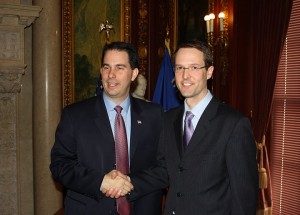Governor Scott Walker and the Republican-controlled Legislature are off to a fast start. In the first month of taking office, the Legislature has actively passed a number of Gov. Walker’s special session bills focusing on job creation.
2011 Wis. Act 2, contains major legal reforms. This landmark legislation was the first piece of legislation to pass both houses.
Special Session AB 8/SB 8 makes a number of important changes to the agency rulemaking process. In general, the new law makes the Governor and the Legislature more accountable for the adoption of regulations and forces agencies to be more transparent about how proposed rules impact regulated businesses.
Wisconsin Act 7 creates a new quasi public Authority called the Wisconsin Economic Development Corporation (WEDC), which essentially represents Phase 1 of the Governor’s plan to completely reorganize the current Department of Commerce. Phase 2 of the Commerce Department reorganization is expected to be presented later this month in the Governor’s biennial budget bill.
Health Savings Accounts: As amended and passed, the bill provides a tax deduction rather than a tax credit of 6.5 percent as contained in the Governor’s original proposal. Under the new law, a person may exclude from his/her personal income tax the amount paid into a health savings account (HAS).
Earnings from HSA contributions, and employer contributions, are also excluded from personal income for state tax purposes. The exclusion first applies to tax years beginning on Jan. 1, 2011. The change puts Wisconsin in line with the tax treatment of HSAs by the federal government and all but three other states.
The bill was signed into law by Governor Walker on January 24th as 2011 Wis. Act 1.
Tax Deduction/Credit for A Business that Relocates in Wisconsin: As amended and passed, the bill creates a tax deduction for business income earned by an individual or pass-through income from a partnership, limited liability corporation (LLC), or tax-option corporation for tax years beginning after December 31, 2010. The deduction may be claimed by a business that moves either 51 percent or more of the workforce payroll or at least $200,000 of paid wages to Wisconsin.
The deduction may be claimed for two consecutive tax years, beginning with the tax year the business begins doing business in Wisconsin. An individual may not take the deduction if the individual or pass-through entity has done business in Wisconsin during the two preceding taxable years.
The bill also creates a similar tax credit for corporations for tax years beginning after December 31, 2010. Partnerships, LLCs, and tax-option corporations are not allowed to claim the credit, but may claim the deduction.
The legislation was signed into law by Governor Walker on January 31st as 2011 Wis. Act 3.
Economic Development Tax Credit Program: The bill increases the maximum total amount of economic development tax credits that could be claimed by $25 million. Coupled with the $73 million in credit cap available under the current program, $98 million in total credits would be available beginning January 1, 2011.
Under the program, individual income or corporate income tax credits may be claimed for conducting a qualified job creation, capital investment, employee training, or corporate headquarters location or retention project.
The legislation was signed into law by Governor Walker on January 31st as 2011 Wis. Act 4.
Supermajority for Passage of Tax Increases: The bill (Special Session AB 5) prohibits the Legislature from passing a bill that would increase the state sales tax or the individual income tax unless approved by a two-thirds majority. The prohibition would not apply if a majority of voters in a statewide advisory referendum approved of the tax increase.
The legislation has passed both houses and is awaiting the Governor’s signature.
The activity during the Special Session over the last several weeks should, as promised, provide substantial tools for economic development and improve Wisconsin’s business climate.




